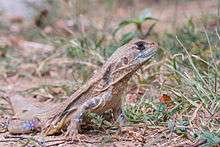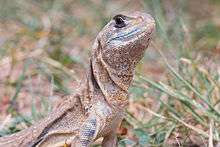Common butterfly lizard
| Common butterfly lizard | |
|---|---|
 | |
| Scientific classification | |
| Kingdom: | Animalia |
| Phylum: | Chordata |
| Class: | Reptilia |
| Order: | Squamata |
| Suborder: | Iguania |
| Family: | Agamidae |
| Genus: | Leiolepis |
| Species: | L. belliana |
| Binomial name | |
| Leiolepis belliana | |
| Synonyms | |
The common butterfly lizard (Leiolepis belliana), or simply butterfly lizard, is a widespread species native to Asia.
Etymology
The specific name, belliana, is in honor of English zoologist Thomas Bell.[3]
Geographic range
L. belliana can be found in the forests of Cambodia, Indonesia, Malaysia, Myanmar, Thailand, and Vietnam.[1]
Description
L. belliana is known for the beautiful patterns on its back and sides. It has yellow spots on its back, and small orange and black lines on its sides.
Introduced species
L. belliana has been introduced into the United States, in Florida. It seems to have an established population there.
Habitat
L. belliana lives on land that has been prepared for agricultural uses, as well as open sandy land along the coasts.
Ecology
Reproduction
L. belliana is monogamous, with a single adult pair inhabiting the same burrow, where 3-8 eggs are laid during hot, dry weather. This species is also exhibits parental care of neonates, with neonates sharing their parents' burrow for a few months before digging their own burrow nearby.[4]
Diet
Butterfly Lizards feed on vegetation, crabs, grasshoppers, beetle larvae, butterflies, and other insects. [4]
Habitat
Leiolepis belliana digs and lives in a burrow ca. 30 cm deep and 70 cm long , to which it returns before dark, and uses its flattened body to seal the entrance to protect it from nocturnal predators. These burrows are also used during reproduction and as refuge from weather and fires. [5]
Invasion of Florida
The Miami population of Leiolepis belliana originated from a tropical fish dealer and the population was already well established in 1992. Leiolepis belliana is readily available in the pet trade, and reptile collectors are probably not exploiting the Miami population because this species is located on private properties in a residential area, difficult to catch, and not worth much as individuals typically wholesale for $3.50–5.50 each. The ecological impacts of L. belliana on native species in Florida are unknown. [5]
References
- 1 2 "Leiolepis belliana ". The Reptile Database. www.reptile-database.org.
- ↑ Boulenger GA (1890). The Fauna of British India, Including Ceylon and Burma. Reptilia and Batrachia. London: Secretary of State for India in Council. (Taylor and Francis, printers). xviii + 541 pp. (Leiolepis belliana, pp. 156-157).
- ↑ Beolens, Bo; Watkins, Michael; Grayson, Michael (2011). The Eponym Dictionary of Reptiles. Baltimore: Johns Hopkins University Press. xiii + 296 pp. ISBN 978-1-4214-0135-5. (Leiolepis belliana, p. 22).
- 1 2 "Nonnatives - Butterfly Lizard". myfwc.com. Retrieved 2018-05-12.
- 1 2 Enge, Kevin; Krysko, Kenneth (2005-01-01). "A new non-native lizard in Florida, the butterfly lizard, Leiolepis belliana (Sauria: Agamidae)". Florida Scientist. 68: 247–249.
Further reading
- Hardwicke T, Gray JE (1827). "A Synopsis of the Species of Saurian Reptiles, collected in India by Major-General Hardwicke".
Zoological Journal [London] 3: 213-229. (Uromastix belliana, new species, p. 220). - Smith MA (1935). The Fauna of British India, Including Ceylon and Burma. Reptilia and Amphibia. Vol. II.—Sauria. London: Secretary of State for India in Council. (Taylor and Francis, printers). xiii + 440 pp. + Plate I + 2 maps. (Leiolepis belliana, pp. 238–240, Figure 61).

